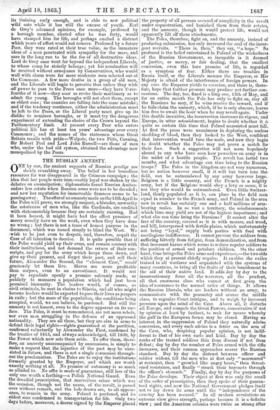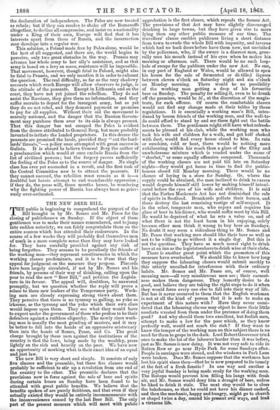THE RUSSIAN AMNESTY.
ONE by one, the ancient supports of Russian prestige are slowly crumbling away. The belief in her boundless 'resources for war disappeared in the Crimean campaign; the idea that her people were immoveably loyal was shaken by the -debates on emancipation • diplomatists found Russian Ambas- sadors less astute when emancipation; arms were not to be dreaded ; -and now her reputation for immoveable firmness seems to be passing away. The oll er of an amnesty made on the 13th April to the Poles will prove, we strongly suspect, a blunder, unworthy the astuteness of men who, like the Cardinals, are credited with statesmanship because they are certainly cunning. Had 'it been honest, it might have had the effect promises of mercy usually have on the weak, even when they have done no wrong ; but there is not a trace of honest purpose in the -document, which was issued simply to blind the West. We -wish to be just even to despots, and, therefore, acquit the 'Czar of all intention to deceive. It is quite possible that if the Poles would yield up their arms, and remain content with their institutions, and not demand the return of their con- -scripts, and pay for the army which keeps them down, and _give up their present, and forget their past, and sell their future, Alexander the Second, the " element Czar," would graciously let them live. Slaves are more profitable than corpses, even to an executioner. It would not pay to repudiate openly a promise solemnly made, or publicly to massacre a population which had just been promised immunity. The leaders would, of course, as -civil criminals, be sent in chains to Siberia, and all who might become leaders would be exported to pass their lives as paupers in exile ' • but the mass of the population, the conditions being accepted, would, we can believe, be pardoned. But still the amnesty is not honest, even to the degree apparent on its sur- face. The Poles, it must be remembered, are not mere rebels, nor even men struggling in the defence of an oppressed nationality. They are all these, but they are also in arms to .defend their, legal rights—rights guaranteed at the partition, -confirmed voluntarily by Alexander the First, confirmed by the treaties of 1815, and always acknoWledged, till 1830, by the Power which now sets them aside. To offer them, there- fore, an amnesty unaccompanied by concessions, is simply to make a request that the injustice of the past may be unre- sisted in future, and there is not a single concession through- out the proclamation. The Poles are to enjoy the institutions formerly granted by the Emperor, and which are worth .exactly nothing at all. No promise of autonomy is so much as alluded to. No offer is made of guarantees, still less of the only one worth a farthing—a Polish National Guard. Even the dreadful proscription, that marvellous crime which was the occasion, though not the cause, of the revolt, is passed over without remark, and the lads drawn are, to all appear- ance, to remain in the army. Poland is pardoned, and its eldest sons condemned to transportation for life. Only two days before, moreover, a decree signed by the Emperor, placed the property of all persons accused of complicity in the revolt under sequestration, and banished them from their estates, and the amnesty, though it would protect life, would not apparently lift off these attachments. the declaration of independence. The Poles are now treated as rebels; but if they can resolve to shake off the Itomanoffs altogether, to decline all compromise, and insist on a nationality under a King of their own, Europe will find that it has interests apart from those of Russia, and the insurrection may develope into a regular war.
This solution, a Poland made free by Poles alone, would be the best of all suggested, and there are, the world begins to perceive, only two great obstacles in the way. Prussia may advance her whole army to her ally's assistance, and as that army is based on a levy en masse, resistance will be impossible. That movement, however, though fatal to Poland, might also be fatal to Prussia, and we only mention it in order to exhaust the question. The real difficulty, so far as the very shadowy accounts which reach Europe will allow observers to judge, is the attitude of the peasants. Except in Lithuania and on the coast, they have not yet joined the rebellion. They do not assist the Russians, they give them no information, and they suffer recruits to depart for the insurgent army, but as yet they do no not rebel, and they demand payment or promises to pay for all supplies. Without their aid the movement is scarcely national, and the danger that the Russian Govern- ment may purchase them over to its side is always present. That this danger has not escaped the Poles is evident from the decree attributed to General Berg, but more probably invented to irritate the landed proprietors. In this decree the peasants are promised the lands, provided they " cut the land- lords' throats,"—a policy once attempted with great success in Galicia. It is absurd to believe General Berg the author of a proclamation which would at once exclude Russia from the list of civilized powers ; but the forgery proves sufficiently the feeling of the Poles as to the source of danger. No single class has ever yet succeeded in a revolt, and the first task of the Central Committee now is to attract the peasants. If they cannot succeed, the rebellion must remain as it is—a doubtful but heroic attempt to end unendurable oppression ; if they do, the press will, three months hence, be wondering why the fighting power of Russia has always been so griev- ously over-estimated.































 Previous page
Previous page